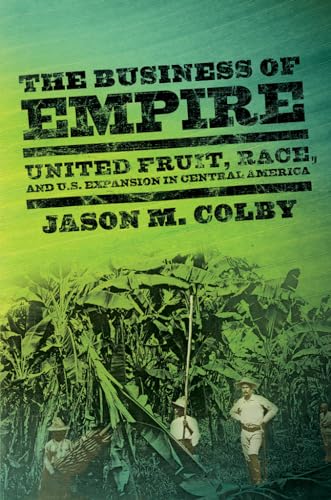The Business of Empire: United Fruit, Race, and U.S. Expansion in Central America (The United States in the World)


артикул: COM9780801478994NEW
СОГЛАСНО НАШИМ ДАННЫМ, ЭТОТ ПРОДУКТ СЕЙЧАС НЕ ДОСТУПЕН
$20.68
Доставка из: Канада
Описание
The link between private corporations and U.S. world power has a much longer history than most people realize. Transnational firms such as the United Fruit Company represent an earlier stage of the economic and cultural globalization now taking place throughout the world. Drawing on a wide range of archival sources in the United States, Great Britain, Costa Rica, and Guatemala, Colby combines "top-down" and "bottom-up" approaches to provide new insight into the role of transnational capital, labor migration, and racial nationalism in shaping U.S. expansion into Central America and the greater Caribbean. The Business of Empire places corporate power and local context at the heart of U.S. imperial history. In the early twentieth century, U.S. influence in Central America came primarily in the form of private enterprise, above all United Fruit. Founded amid the U.S. leap into overseas empire, the company initially depended upon British West Indian laborers. When its black workforce resisted white American authority, the firm adopted a strategy of labor division by recruiting Hispanic migrants. This labor system drew the company into increased conflict with its host nations, as Central American nationalists denounced not only U.S. military interventions in the region but also American employment of black immigrants. By the 1930s, just as Washington renounced military intervention in Latin America, United Fruit pursued its own Good Neighbor Policy, which brought a reduction in its corporate colonial power and a ban on the hiring of black immigrants. The end of the company's system of labor division in turn pointed the way to the transformation of United Fruit as well as the broader U.S. empire.
График изменения цены & курс обмена валют
Пользователи также просматривали

$32.50
Fashion Women Oval PU Leather Dumpling Shoulder Bags Female Casual Solid Color Handbags for Women Luxury Ladies Underarm Bags
joom.com
$138.00
Modern ceiling lights Novelty Aluminum LED living room fixtures bedroom ceiling lamps Nordic Home Ceiling lighting
aliexpress.com
$14.99
Celmia 2022 Shoulder Sheer Tunics Fashion Summer Lapel Shirts Women Elegant Flare Stitching Blouse Lady Office Long Sleeve Tops
aliexpress.ru
$11.65
Женская одежда, весна-осень, корейская мода, Ins тренд, смайлик, счастливое время, милый топ большого размера
aliexpress.ru
$23.45
Футболка мужская с коротким рукавом, шелковая тенниска, брендовая майка с рукавом до локтя, лето
aliexpress.ru
$1.75
Figure oil painting flying dream white skirt goddess art canvas painting living room corridor office home decoration mural
aliexpress.com
$69.35
Новый старинный Египетский стоя голова птицы украшение комнаты спад путешествия памятник
aliexpress.com
$13.51
Женская обувь без шнуровки на кроссовки неглубокие мокасины; Туфли с подошвой из вулканизированной резины дышащая открытая повседневная о...
aliexpress.com
$34.89
Demon Slayer Throw Blanket for Unisex Adult Hooded Blanket for Sofa Wearable Blanket Home Sherpa Fabric Blanket Flannel Blanket
aliexpress.com
$67.41
Maple Wood 6-string Humbucker Pickups for Electric Guitar Replacement Parts Accessory
aliexpress.com
$1.49
Asuna Sword Art Online TPU Case For Airpods Pro Earphone Case For Airpods Wireless Bluetooth Case For AirPods 3
aliexpress.com
$34.63
2020 spring new korean women's blouses blusas solid color v-neck bandage silk satin ladies shirt wild shirt slim straight pants, White
dhgate.com
$8.01
13 Pockets Plastic Expanding Accordion Folders, Letter Size Portable Document Holder, A4 File Organizer
aliexpress.com
$70.40
12 pcs VAPCELL INR 18350 1100mAh lithium battery 3.7V rechargeable battery continuous 9A electronic smoke E-CIG IMR BATTERY
aliexpress.com
$2.87
dog Transparent Clear Stamps for DIY Scrapbooking/Card Making/Kids Christmas Fun Decoration Supplies
aliexpress.com
$8.00
Promotion 150ml Aroma Essential Oil Diffuser Ultrasonic Air Humidifier with PP material LED Lights for Office Home
aliexpress.com













